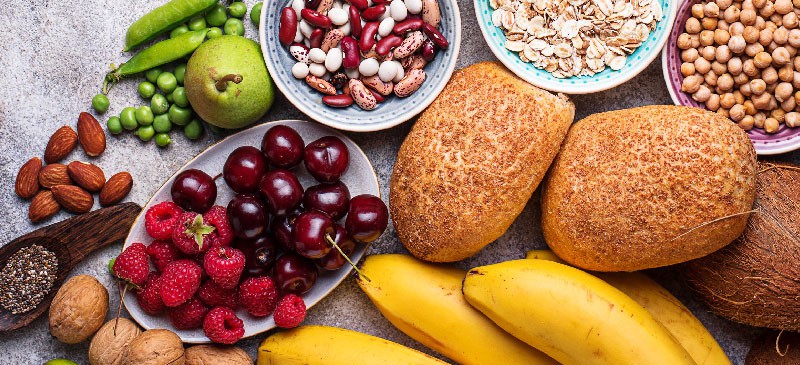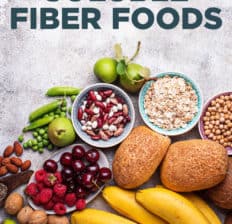This Dr. Axe content is medically reviewed or fact checked to ensure factually accurate information.
With strict editorial sourcing guidelines, we only link to academic research institutions, reputable media sites and, when research is available, medically peer-reviewed studies. Note that the numbers in parentheses (1, 2, etc.) are clickable links to these studies.
The information in our articles is NOT intended to replace a one-on-one relationship with a qualified health care professional and is not intended as medical advice.
This article is based on scientific evidence, written by experts and fact checked by our trained editorial staff. Note that the numbers in parentheses (1, 2, etc.) are clickable links to medically peer-reviewed studies.
Our team includes licensed nutritionists and dietitians, certified health education specialists, as well as certified strength and conditioning specialists, personal trainers and corrective exercise specialists. Our team aims to be not only thorough with its research, but also objective and unbiased.
The information in our articles is NOT intended to replace a one-on-one relationship with a qualified health care professional and is not intended as medical advice.
Top 20 Soluble Fiber Foods + Their Benefits
February 9, 2023

Fiber is a type of material found in carbohydrates that the human body cannot digest. We get two types of fiber from our diets: soluble fiber and insoluble fiber. Most carbohydrate foods that are high in fiber contain both types, although foods tend to be higher in one kind or another.
What are the benefits of soluble fiber? Soluble fiber attracts water, creating a gel-like consistency in the digestive system that helps slow down digestion and keeps you feeling full between meals and “regular.” It also promotes heart and metabolic health.
Eating soluble fiber — found in high-fiber foods like whole grains, legumes, vegetables and fruit — can help lower blood cholesterol and glucose levels, offering some protection against metabolic syndrome, weight gain and conditions like diabetes.
What Is Soluble Fiber?
The definition of soluble fiber is fiber that dissolves in water and is viscous and fermentable. Insoluble fiber is different than soluble fiber because it does not dissolve in water and remains intact while it travels through the digestive system.
One way you can tell if a food is higher in soluble fiber than insoluble fiber is to add water to it. If it appears to absorb water and become gel-like, which happens with foods like flaxseeds or oatmeal, then it contains a good deal of soluble fiber.
Soluble Fiber vs. Insoluble Fiber
Compared to soluble fiber, insoluble fiber is recommended more for relieving constipation since it adds bulk to the stool and helps move food through the gastrointestinal tract. Insoluble fiber is also beneficial for helping clear out carcinogens and unhealthy particles from the gastrointestinal tract.
That is why it can help prevent diverticulitis, heart disease, diabetes and even colorectal cancer.
Insoluble fiber cannot be fully broken down or digested in the GI tract — therefore some people feel that calories from fibrous foods shouldn’t “count” toward their daily calorie intake.
Among the best insoluble fiber foods are wheat bran, oat bran, beans, legumes, vegetables and whole grains. Some of the top insoluble fiber vegetables to include in your diet for digestive health and other benefits are okra, green peas, turnips and radishes.
What are the best soluble fiber foods? Some soluble fiber foods include oat bran, barley, seeds and legumes, like lentils or navy beans. That’s not all. Read on for a lengthier list of soluble fiber foods below.
Top 20 Soluble Fiber Foods
Wondering if potatoes are high in soluble fiber? Are bananas soluble or insoluble fiber?
Let’s take a look at this top soluble fiber foods list:
- Psyllium husk
- Flaxseeds
- Passion fruit
- Whole grains, like barley, oats/oat bran, amaranth, etc.
- Lentils and other legumes, like green peas
- Beans, including black, kidney, white, lima and navy beans, edamame, etc.
- Tofu and tempeh (fermented soy products)
- Avocado
- Brussels sprouts, cabbage, broccoli and other cruciferous veggies
- Sweet potato
- Asparagus
- Turnips
- Dried figs, prunes, apricots and dates
- Oranges and nectarines
- Pears
- Apples
- Peaches
- Carrots
- Corn
- Macadamia nuts
Health Benefits
1. Promotes Cardiovascular Health
What is soluble fiber good for when it comes to heart health? Studies suggest that eating a diet that’s high in soluble fiber may help lower your risk of developing high cholesterol and heart disease.
Research links soluble fiber to lower total and LDL cholesterol levels because soluble fiber binds to cholesterol particles and ushers them out of the body. It can also interfere with the reabsorption of bile acids in the intestines, which are high in cholesterol and released into the intestine by the gallbladder to help with the digestion of fats.
While there are several kinds of soluble fiber, studies suggest that there isn’t much difference in terms of how they positively impact cholesterol. An example of a high-fiber diet that is linked to cardiovascular benefits is the Mediterranean diet, which includes healthy foods like vegetables, legumes, whole grains and nuts.
2. Improves Digestion and Promotes Gut Health
Both types of fiber for important for promoting gut health, preventing constipation by bulking stool, clearing out the digestive system and feeding beneficial “probiotic” bacteria.
Does soluble fiber get digested? Soluble fibers are considered to be prebiotic. This means they are broken down by bacteria in the colon.
Soluble fiber helps “feed” beneficial bacteria in the human gut and is fermented by good bacteria that have many roles for promoting health. This process of fermentation can wind up causing gas and bloating in some people but otherwise is a very health-promoting process.
Which fiber is best for diarrhea? If you struggle with loose stools it’s best to focus on increasing soluble fiber intake.
Insoluble fiber may make diarrhea worse since it tends to speed up transit time of food through the intestines. On the other hand, if you deal with constipation, increasing insoluble fiber in your diet is a natural way to help reverse the problem.
3. Helps with Metabolic Health and Weight Management
There’s plenty of evidence that diets high in fiber are protective against metabolic syndrome, a condition marked by high levels of belly fat, high triglycerides, low beneficial HDL cholesterol, high blood pressure, high blood sugar and sometimes obesity.
Soluble fiber found in carbohydrate foods helps prolong stomach emptying, partially by absorbing water in the stomach and intestines. This increases the feeling of fullness and helps release sugar into the blood more slowly.
Because soluble fiber foods can promote satiety, they may help control your appetite, reduce cravings or snacking between meals, and help with weight loss, including helping to lose belly fat.
4. Helps Stabilize Blood Sugar Levels
Studies suggest that when it comes to metabolic health, benefits of soluble fiber include its ability to not only lower blood cholesterol and triglycerides, but also blood glucose (sugar) levels. Eating a high-fiber diet can promote insulin sensitivity and help reduce inflammation and prevent obesity, both of which are risk factors for developing type 2 diabetes.
Supplement Options and Dosage
How much soluble fiber per day is recommended?
How much fiber per day? The U.S. Department of Agriculture recommends that adult men get 30 grams or more of total fiber per day and adult women aim for 25 grams or more. Yet studies suggest that most Americans typically get less than 15 to 16 grams of total fiber on most days.
You don’t need to spend too much time thinking about how many grams you are getting of each type of fiber, as long as you eat a variety of high-fiber foods and don’t struggle with diarrhea or constipation on an ongoing basis.
That said, you may want to specifically focus on increasing your soluble fiber intake if you need help lowering your LDL cholesterol. Consuming five to 10 grams of soluble fiber per day has been shown to help reduce LDL cholesterol levels.
Ideally you’ll get the fiber you need from eating a diet filled with a variety of unprocessed plant foods. However, in some cases a soluble fiber supplement can be a good addition to your diet, such as to prevent constipation or diarrhea.
Fiber supplements come in various forms:
- powders
- pills
- chewable tablets or capsules
- wafers
- chocolates
- more
The term “functional fiber” is now used to describe fiber that has been extracted from plant or animal sources, manufactured or synthesized, and then added to processed foods.
One of the most popular soluble fiber supplements is psyllium husk, which can be combined with water and taken by mouth to help with digestion, cholesterol management and more. Psyllium is soluble fiber that is sourced from the seed husks of plants belonging to the genus Plantago.
Fiber supplements including Metamucil and Konsyl are primarily made with psyllium. Other soluble fiber supplements are made with ingredients including powdered cellulose, guar gum, pectin, acacia fiber and wheat dextrin.
It’s best to start with a low dose of a fiber supplement and increase gradually as needed based on your reaction. The amount of fiber in different supplements varies by the product, so always read dosage recommendations carefully.
Risks and Side Effects
To help prevent digestive issues, including bloating or constipation, it’s best to add soluble fiber foods to your gradually and also to drink plenty of water.
It’s possible for fiber supplements to interact with certain medications, such as by lowering blood sugar levels and blocking the absorption of certain drugs. If you take any of the following medications, speak with your doctor before taking soluble fiber supplements:
- Cholesterol medications
- Warfarin (Coumadin)
- Aspirin
- Seizure medications











